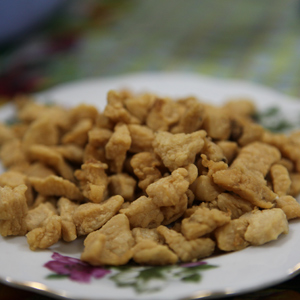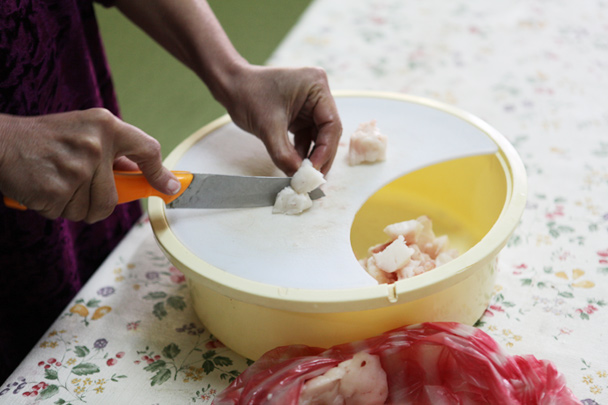When my new friend Samad flashed me the now all-too-familiar combination of a hesitant smile and a blank stare of complete incomprehension, I knew that I had no choice. It was time to play my last card.
Above us, a gigantic, honey-yellow statue of the 12th-century Muslim scholar Mubarak Ben Ahmed Sharaf-Aldin gazed beatifically at the horizon, which was filling rapidly with the harsh white light of a Middle Eastern sun. A hundred feet below us, the modern neighborhoods of the Iraqi Kurdish city of Arbil spread out as far as the eye could see, beginning with the bustling hive of the Qaysari Bazaar, one of the oldest in the world. Shouting out in Soranî, eager hawkers and wary buyers lapped like an ocean of commerce against the foot of the massive plateau on which we now stood.
And behind us, dominating that plateau, rose the southern gate of the ancient walled Citadel of Arbil, which claims to be the oldest continuously inhabited community in the world. Over the past 8,000 years, conquering armies of Akkadians, Babylonians, Mongols, Arabs, Persians, and Ottomans had all come to this exact spot in their quest for glory and immortality. In 331 B.C., Darius III of Persia had sought refuge behind the gates of Arbil in a vain attempt to escape becoming the most high-profile victim of Alexander the Great’s ineluctable destiny.
But I was just looking for a good meal. A specific meal, and a special meal, but still just a meal. Much easier, right? Obviously not, because I was now reduced to one last, desperate attempt to explain to Samad what I’d been seeking for days.
So as the bearded, saintly face of Mubarak Ben Ahmed Sharaf-Aldin and eight millennia of epic history bore witness, I spun my backside toward my new friend Samad’s face, slapped it loudly, and bleated, “Baa, baa!”
Samad’s tentative smile broke into a genuine grin. “Ah, yes,” he said. “I know what you are looking for.”
What I was looking for was, to put it simply, a meal straight from a sheep’s ass. When I’d decided to travel to Iraqi Kurdistan for a couple weeks with my old college friend Mark, I asked for food suggestions from Yigal Schleifer, the cofounder of Istanbul Eats and a friend from grad school who’d traveled to the Kurdish northern region of Iraq, which has a separate government from Baghdad and has been largely safe for travelers for years. Yigal shot back with an email about a dish he’d never tried himself, and which he didn’t recall the name of, but that Kurds apparently went wild for. They took the nub of fat from a sheep’s ass, he explained, and turned it into something indescribably delicious.
Sheep butt almost immediately took on a mythical quality for me, and I envisioned a pair of nubile Assyrian priestesses rubbing sopping sponges dipped in hot sheep fat over the plump buttocks of a fierce but flavorful ram in an ancient temple of earthly delights.
But when I got to Iraq, no one seemed to know what the hell I was talking about.
I first tried the slap-my-butt-and-baa act in the down-and-out town of Halabja, the site of an infamous chemical-warfare attack by Saddam Hussein that killed thousands of Kurds (and, disconcertingly, one of the cheeriest, most welcoming places I’ve ever visited). I tried asking the staff and patrons of a hole-in-the-wall shawarma place, encouraged by the fact that the floors and walls were so slick with mutton grease that I nearly lost my balance as I entered. My scant Soranî exhausted, I launched into my routine, to the delight of the all-male clientele. (“Honey,” I imagined many of them telling their wives that evening. “You’ll never believe how Americans order lunch!”)
Still tittering, the guy manning the meat spit handed me generous slices of juicy brown meat nestled in a samoun—the triangular flatbread that’s synonymous with mealtime—and layered it with fresh chopped tomatoes and onions, sliced cucumbers, and sprigs of parsley. It was delicious, but was it sheep butt? That’s when one of my fellow customers finally suddenly decided to reveal he actually spoke English.
I asked what animal the meat came from. “Could be sheep, could be deer, could be anything,” he said, as I bit my tongue about why he couldn’t have piped up before I’d made a fool of myself. “It’s meat.”
I counted that as a no.
In Sulaymaniyah, the sleek cultural capital of Iraqi Kurdistan, Mark and I went to one of the fancy and relatively expensive Kurdish eateries that have popped up alongside the high-rise office buildings, foreign-car dealerships, and branch offices for international oil conglomerates. A waiter there had put in a special order the day before for rani berekh (“lamb meat”) just for me, and brought it out amid a flotilla of traditional Kurdish dishes that included fried kibbeh, a tasty creamy chicken-lemon soup, and a savory dish of potted chicken chunks that roasted slowly in a clay vase over an open flame until it was cooked perfectly.
The rani berekh came out last, chunks of grilled lamb on a bed of rice and covered with a scattering of French fries. It was a bit gamey and had flecks of bone in it, but wasn’t bad. It also wasn’t sheep butt, instead coming from a cut from the side of the animal (we asked the waiter to point to the part of the body it came from using our bodies as guides).
Strike two.
That left Samad, an amiable computer student in Arbil, the political capital of Iraqi Kurdistan. What I was looking for, he said, was a dish called kska that, just like Yigal had described, was made from the long chunk of flavor-packed fat from the back end of a sheep. The only problem, he said, was that it was terribly old-fashioned, and very few people—and certainly no restaurants—made it anymore.
I would just have to come and have it at his home with his family.
Samad lived with his brothers and sisters in a suburb of Arbil nicknamed Gemade (“Nevermind,” because it had started out as a technically illegal but unofficially sanctioned shantytown). Their mother and father had died in an incident they obviously didn’t want to talk about, but Samad’s older sister-in-law, Ashna, remembered how to make kska. The fat came in a tenderloin-shaped chunk weighing about a little over a pound, which she cubed and set in a pot over a low flame to render. After she took the pot off the flame, she poured off the oil (old Kurdish families originally made kska for the oil, which was used for cooking in the days before people had access to Turkish olive oil) and strained out what was left, the waxy-looking, yellow-white little chunks of sheep fat that was the kska proper.

Ashna brought out a bucket of samoun to accompany the dish, but I popped one in my mouth to try kska on its own. It was crispy and sizzled against my tongue at first, but crumbled as soon as I bit down. The center had a little bite, like pork cracklings, and released a satisfying little gush of salty, liquefied fat as the chunk melted down my throat.
Before I knew it, I was scarfing down kska like popcorn, then as in a sandwich. By the time we returned to our hotel rooms, I was burbling gently in a sheep-butt-induced haze of fat and salt.
“So are we done with sheep butt?” Mark asked.
“I believe we are finally finished with sheep butt,” I said.
Then I had to go and ruin it by rereading Yigal’s email. The Kurdish dish he described was grilled, a detail I hadn’t noticed amid my haphazard education in all the possible ways to say “sheep” and “butt” in the various Kurdish dialects, all the false leads, and, yes, all the ass-slapping.
I looked at the increasingly stinky leftover kska Samad had given us, which had already fully saturated the paper bag I’d carried it in and was now sitting in a slowly spreading circle of sheep fat on the hotel-room table. Close enough. It was time to eat something made of chicken.
Brooklyn-based Michael Y. Park has written for The New York Times, the New York Post, and the Toronto Globe and Mail, and he is a regular contributor to Epicurious. Park has feasted at a picnic with the king and queen of Malaysia, and dined on roadside kebabs while disguised as a Hazara tribesman in Afghanistan. He has written numerous articles for Gourmet Live, including a piece about eating camel in Mauritania.

